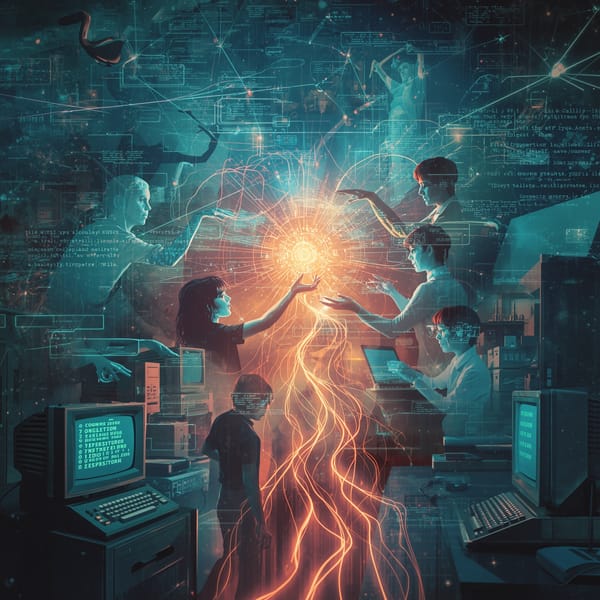Career Growth in a Shifting Economy
Reflecting on career growth amid rapid AI advancements, Vergel urges tech professionals to introspect and align personal values with their careers. By embracing transferable skills like empathy and co-creating with AI, they can bridge technology and humanity, shaping a future that honours both.

*Preface: This article emerged from a series of collaborative discussions with AI, including ChatGPT and Claude, during October 2024. It represents an exploration of career evolution in an AI-augmented future.*
What Does the Future Even Mean Anymore?
For those of us in tech, the challenge isn't just keeping pace with change - it's maintaining our relevance while delivering value to clients and users in an increasingly AI-driven landscape. Looking ahead, even just a few years, requires more than external adaptation. It demands deep introspection about our core values, passions, and the unique contributions we aspire to make. What becomes of our inner compass when the world oscillates between hyper-connectivity and profound disconnection?
In an era where technological advancements and economic shifts reshape the landscape almost daily, our culture barely has time to process these changes, let alone reflect them through meaningful media. The absence of new Hollywood visions of "the future" is telling - perhaps because we're too busy living through technological upheaval to imagine what comes next.
This realization sparked a personal crisis: what unique value can UX professionals bring to a world that's rapidly redefining itself? Without collective dreams of tomorrow to guide us, how do we forge meaningful career paths?
The job market's transformation is dizzying. Specialized roles are being reduced to AI-managed prompts, while industry expertise finds new life in unexpected places like YouTube channels. Meanwhile, well-meaning business teams fragment the product creation process in search of differentiation - often without creating tangible value.
If you're still reading, you're likely asking the same question: what's next?
While definitive answers remain elusive, these questions serve as a compass for exploring our evolving role in tech. To navigate this transition, we need to address four fundamental questions:
- What aspects of the human experience are we uniquely positioned to enhance?
- Where in our professional landscape can we provide meaningful leadership?
- How can we bring our authentic selves into these spaces?
- Why do we persist in seeking relevance and participation?
The answer lies in an introspective journey - one that helps us identify the skills worth cultivating, the experiences worth pursuing, and the legacy we hope to build. This isn't optional anymore; it's a migration we must all undertake because there's no going back to the familiar shores of predictable career progression.
Building a Meaningful Career in the Economy of Experiences
Welcome to the Economy of Experiences - where careers aren't just sequences of jobs but collections of meaningful engagements that reflect our values and aspirations. Success in this economy requires more than technical proficiency; it demands authentic engagement with the human elements of our work.
As we edge into an unknown tomorrow, our professional worth won't just be measured by our technical output, but by our ability to create meaningful experiences and connections. The question isn't whether the wider economy will reward this approach, but how we can help shape an economy that values both technological progress and human connection.
Our industry won't suffer the fate of buggy whip makers - not if we continue to evolve and adapt. Instead of being replaced by AI, we're learning to co-create with it, as demonstrated by this very article. Our role is transforming from designers of interfaces to architects of experiences, from problem-solvers to meaning-makers.
Embracing Dualities: Bridging Technological and Human-Centric Worlds
We inhabit a world of striking contrasts. In urban centres, technology infuses every aspect of life, while in other communities, human connection and tangible experiences remain paramount. As UX professionals, we're uniquely positioned to bridge these worlds, creating technologies that enhance rather than replace human connection.
Imagine a near future where technology and human-centric values converge - where collaboration matters more than profit, and innovation serves inclusion. This isn't just idealistic thinking; it's a potential path forward for our profession.
The Professional Journey-Maker: Transferable Skills for a New Era
The concept of "journey-making" - so central to UX work - takes on new meaning when applied to our own careers. It involves mapping experiences, understanding stakeholders (including ourselves), and continuously adapting to new contexts.
In this shifting landscape, being a "journey-maker" becomes invaluable. Our skills in empathy, adaptability, and strategic thinking become currency in the new economy. What once served to build products now creates pathways for community innovation and human connection.
The future may be uncertain, but by aligning our professional journeys with our deepest values, we can help create a tomorrow that honors both technological advancement and human connection. Here's to the journey ahead, to the societies we'll help shape, and to the new measures of success we'll define together.
This article represents an ongoing dialogue about the future of UX and technology careers. It was developed through collaborative exchanges with AI, demonstrating the kind of human-AI partnership that may define our professional future.





